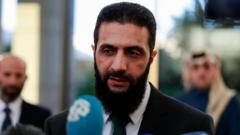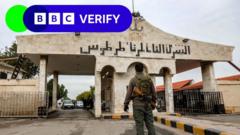In the wake of a historic power shift in Syria, the appointment of rebel leader Ahmed al-Shara as interim president elicits both jubilation and skepticism among the populace regarding the future governance of the nation.
Syria's New Leadership: Celebrations Amid Concerns

Syria's New Leadership: Celebrations Amid Concerns
Ahmed al-Shara's Presidency Raises Questions About Future Governance in Syria
In the Syrian capital of Damascus, excitement swept the streets as rebel leader Ahmed al-Shara was declared the new president overseeing a transitional period following the overthrow of former dictator Bashar al-Assad. This official announcement came amid high expectations, particularly as locals awaited a public address from al-Shara, which, ultimately, never materialized. In lieu of a speech, the state news agency released a series of crucial decisions: the suspension of the Constitution, the dissolution of the old legislature, and the disbanding of the military formed under the deposed regime.
While many citizens rejoiced, celebrating al-Shara’s appointment, others expressed unease regarding the process that led to this decision and al-Shara’s absence from speaking directly to the nation. Critics point to a concerning centralization of power, with concerns that a purely top-down approach may sideline diverse voices within the country’s myriad factions, calling into question the legitimacy and extent of support for al-Shara's leadership.
Dr. Salam Said, a Syrian academic now based in Germany, voiced these concerns, noting that many progressive groups feel marginalized in the new political landscape. The uncertainty surrounding the duration of this "transitional period" has only served to amplify anxieties, with many questioning how the new government intends to engage with the broader population in shaping the future of Syria. The coming weeks will be crucial in determining whether this leadership can unify the country or if it will exacerbate existing divides.
While many citizens rejoiced, celebrating al-Shara’s appointment, others expressed unease regarding the process that led to this decision and al-Shara’s absence from speaking directly to the nation. Critics point to a concerning centralization of power, with concerns that a purely top-down approach may sideline diverse voices within the country’s myriad factions, calling into question the legitimacy and extent of support for al-Shara's leadership.
Dr. Salam Said, a Syrian academic now based in Germany, voiced these concerns, noting that many progressive groups feel marginalized in the new political landscape. The uncertainty surrounding the duration of this "transitional period" has only served to amplify anxieties, with many questioning how the new government intends to engage with the broader population in shaping the future of Syria. The coming weeks will be crucial in determining whether this leadership can unify the country or if it will exacerbate existing divides.





















